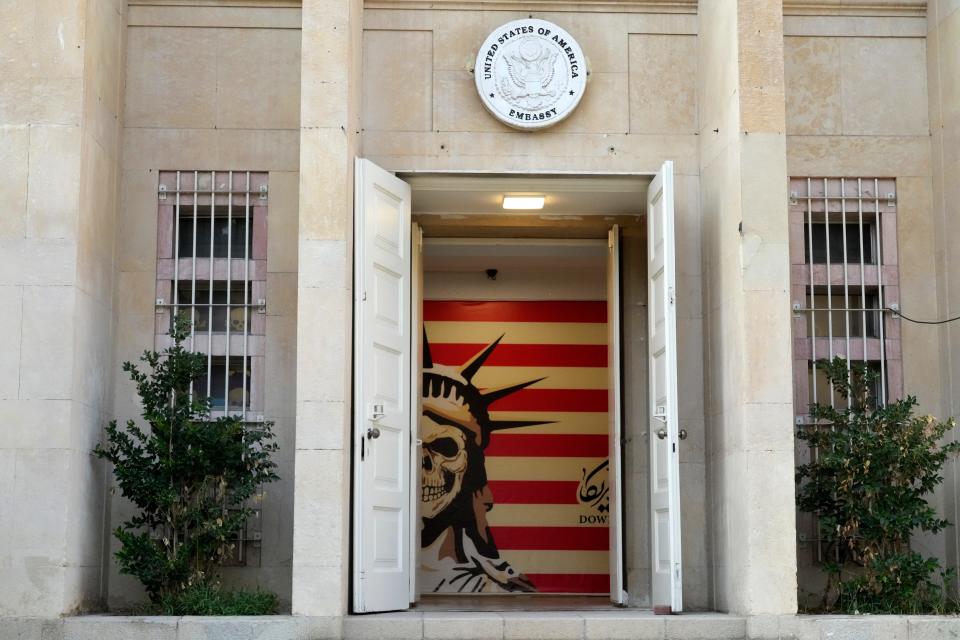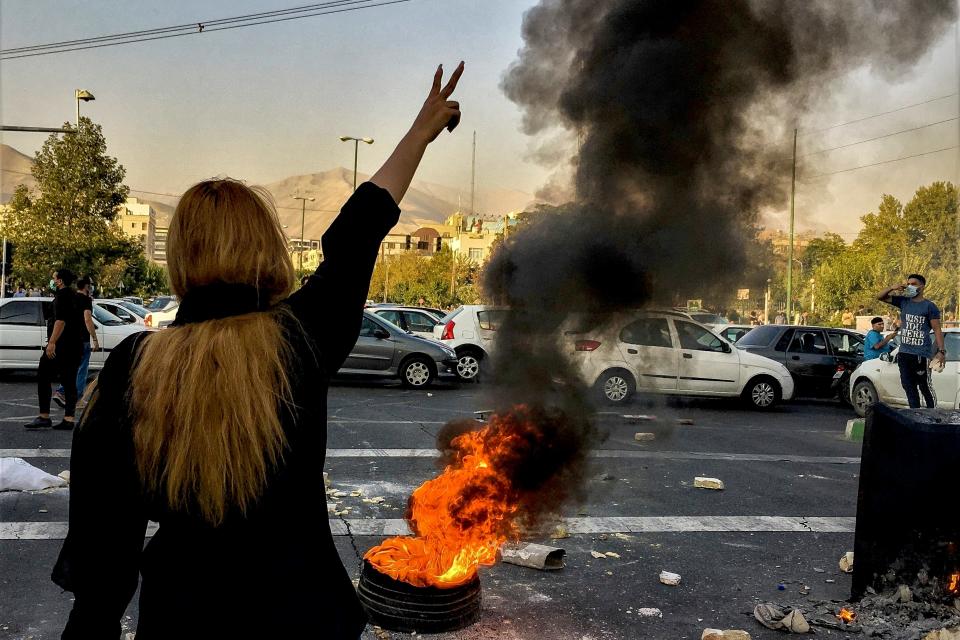US-Iran prisoner swap includes release of White Plains High School graduate
Iran and the United States are swapping prisoners Monday as part of a highly anticipated prisoner exchange. As part of the deal, $6 billion in frozen Iranian oil revenues will be released by the U.S. One of the Americans being released, Siamak Namazi, is a White Plains High School Class of 1989 alumni. His brother Babak graduated in 1987 and worked to get him released.
The prisoner swap, announced by Iranian officials early this morning and confirmed by a senior Biden administration official, means that five Americans imprisoned in Iran would be released from custody as part of the negotiated exchange between Washington and Tehran.
The exchange, while not formally linked to stalled nuclear talks between the U.S. and Iran, comes against a backdrop of tensions that routinely push the two countries toward a potential military confrontation. It also comes ahead of a United Nations General Assembly meeting in New York this week, where President Joe Biden and Iranian hardline President Ebrahim Raisi will both speak.
In addition, the prisoner exchange could inject some new tensions in the U.S. presidential race. Republican presidential candidates in recent weeks have blasted the Biden administration's decision to push ahead with the prisoner exchange, arguing it amounts to paying a random to a state sponsor of terrorism.
The exchange sets free several Americans who had been accused of being spies or working on behalf of the U.S. government in Iran. The United Nations described their detentions as "arbitrary." The White House has also said the allegations are false. In turn, the five Iranians who are being released were accused or convicted of violating U.S. sanctions, Middle East news website Al-Monitor reported.
The five Americans were moved from prison to house arrest in an Iranian hotel in an interim step towards their release last month. The exchange, while not formally linked to stalled nuclear talks between the U.S. and Iran, could be a sign of progress in easing tensions that routinely push the U.S. and Iran toward military confrontation.
The deal emerged after months of indirect negotiations between U.S. and Iranian officials. As part of the deal, the U.S. also released $6 billion in frozen Iranian oil revenues, transferred from banks in South Korea to Qatar, an energy-rich nation on the Arabian Peninsula that is an ally of both nations. The U.S. and Iran have no formal diplomatic relations. The funds are intended to be used for humanitarian purposes only.
U.S. works to free Americans in Iran: Here's what Tehran might get
Inside Iran: America’s contentious history in Iran leads to mix of anger, wonderment and weariness
Here's who and what is in the deal, why it's happening now, and why the American public should take an interest.
Americans, Iranians: Who's being swapped for who?
Three of the five Americans, all dual U.S.-Iran citizens, are Siamak Namazi, the White Plains grad, Emad Sharghi and Morad Tahbaz. The identities of the two other Americans have not been released. The first senior Biden administration official said those two Americans wish to keep their identities private.
The five were expected to board a plane in Iran as early as 5 a.m. Monday Eastern Standard Time for Doha, Qatar. From there they were to travel to Washington, D.C. to be reunited with their families, the administration official said.
Also on the plane will be Namazi's mother and Tahbaz's wife, both of whom were previously unable to leave Iran.
Businessman Namazi, 51, was arrested in 2015 while visiting his family in Tehran. Sharghi, 59, was detained in 2018 a year after moving to Iran from the U.S. to work for a tech investment company. Environmentalist Tahbaz, 67, who also holds British citizenship, was arrested in 2018 while working on a conservation project in Iran.
An American is detained abroad: What happens next? Call the president?
The five Iranians released by the U.S. are Mehrdad Moein Ansari, Kambiz Attar Kashani, Reza Sarhangpour Kafrani, Amin Hasanzadeh and Kaveh Afrasiabi, according to Al-Monitor.
The Biden administration official confirmed that the five Iranians are the individuals whose names have been reported in the media, and said they were charged with or convicted of nonviolent crimes.
The Biden administration official also said the U.S. government will be issuing new sanctions against Iran's ministry of intelligence and its former president, Mahmoud Ahmadinejad, under the Robert Levinson Hostage Recovery and Hostage-Taking Accountability Act, which expands government tools to combat wrongful detentions. The measure was signed into law in late 2020. Levinson, a former FBI agent, disappeared during a visit to an Iranian island in 2007.
'We just know we want our brother home': Inside the secretive world of freeing American hostages abroad
What have the U.S. and Iran agreed to?
The U.S. has been freezing Iran's assets and piling on economic sanctions ever since President Donald Trump pulled out of the 2015 nuclear deal between Iran and world powers in 2018. That deal was aimed at curbing Iran's nuclear activities amid international allegations, which Iran denies, that it's seeking nuclear weapons.
Under the prisoner swap agreement announced early Monday, the U.S. has given the green light to South Korea to effectively pay Iran, through Qatar's banking system, for oil it purchased before the Trump administration imposed sanctions on these types of transactions in 2019. The White House says these funds will be held in restricted accounts in Qatar that will only allow Iran to purchase humanitarian goods such as food, medicine, medical devices and agricultural products, the administration officials said.
If Iran tries to divert the funds or use them for anything other than a limited humanitarian purposes authorized, the Biden administration "will take action to lock up the funds," the official said.
None of the money comes from U.S. taxpayers, according to another senior U.S. official who was not authorized to speak publicly, and it is thus not a ransom. Oversight of how the money is used will be provided by the U.S. Treasury, Qatar and aid organizations.
However, Iran's foreign ministry and state media have also appeared to claim that the unfrozen funds in Qatar would be under Tehran's direct and unrestricted control.
"Humanitarian means whatever the Iranian people need. So, this money will be budgeted for those needs, and the needs of the Iranian people will be decided and determined by the Iranian government," Iran's President Ebrahim Raisi said in a recent interview with NBC News.
Why is this prisoner swap happening now?
As of late August, at least 59 U.S. nationals were known to be held hostage or wrongfully detained in at least 15 countries, according to the James W. Foley Legacy Foundation's annual “Bringing Americans Home” report. The foundation was started after the kidnap and murder of an American freelance journalist.
Over the last decade, several Americans detained in Iran have been released and those negotiations have followed a similar pattern in terms of conditions.
'Undersecretary for thugs': Bill Richardson's endless push to free Americans detained abroad

The U.S. and Iran have not had formal diplomatic relations since 1980, a consequence of the nation's Islamic Revolution and a hostage crisis at the U.S. Embassy in Tehran.
In the decades since tensions have simmered on and off.
That's not about to change.
But Henry Rome, an Iran expert and senior fellow at the Washington Institute for Near East Policy, said that the Biden administration has been viewing a prisoner swap with Tehran as a "prerequisite to moving forward with Iran," including, eventually "resuming some type of nuclear negotiation."
U.S.-Iran pact: Trump destroyed it. Biden wants to restore it. Just don't call it a deal
He said the prisoner exchange represented a "step in the direction of de-escalation." And that if re-elected President Biden could seek to revive the nuclear deal with Iran and world powers in 2025.
Rome added that while American foreign policy attention may be absorbed with Russia and China right now, as the former wages its war in Ukraine and latter increasingly competes with the U.S. on a range of fronts, he believed that if Americans were to "wake up to a war tomorrow it would most likely be with Iran."
He said this was because of the threat to U.S. forces in the Middle East by Iran-backed militias and because of the "constant friction" that results from U.S. attempts to ensure unimpeded travel through the Strait of Hormuz for oil tankers. Iran's navy has hijacked tankers and harassed U.S. naval ships in this area.
Iran claims revenge for Qasem Soleimani: U.S. Navy is still a target
An unhappy anniversary
Still, the timing of the prisoner swap may not be entirely coincidental.
Ebrahim Raisi, Iran’s hardline president, will be in New York this month to attend the United Nations General Assembly, an annual event where 193 UN member states debate war, peace and everything in between.
September 16 also marked the one-year anniversary of the death of Mahsa Amini, a 22-year-old woman who was arrested in Tehran by Iran's so-called morality police, allegedly for violating hijab rules.
A year since Mahsa Amini's death: Britain, U.S. impose new sanctions on Iran
'Woman, life, liberty' Iranians on why they'll risk beatings and death for change

After Amini died in police custody, some of the largest protests in Iran in years erupted. They lasted for months. They were eventually suppressed by Iran's security services in a violent crackdown.
"Iranian authorities are pushing ahead with a range of tactics aimed at breaking the resistance of women. They are bringing economic pain and suffering at a very individual level," said Tara Sepehri Far, a researcher at London-based think tank Chatham House, in a recent online discussion on X, formerly Twitter.
But the anger Amini's death unleashed could be waiting for a new moment to resurface.
"The prisoner release deal will be a huge relief to the long suffering families of the detained," Lauren Rozen, a veteran diplomatic correspondent and Iran expert wrote in her substack newsletter published on Sept. 12
"And it may do a bit to distract from gloomier headlines during Raisi’s New York visit, where he is certain to face protests, at least back home."
The first Biden administration official, however, said there are no meetings planned or envisioned over the coming week with Iranian officials. But the administration does plan, he said, to talk to allies including Britain, France, Germany and others during the diplomatic gathering in New York.
This article originally appeared on USA TODAY: White Plains High School grad among Americans being released in Iran

